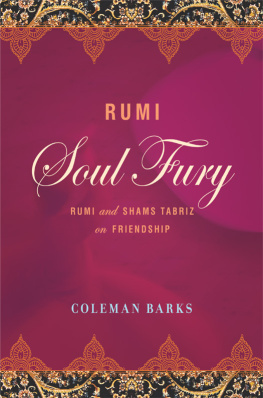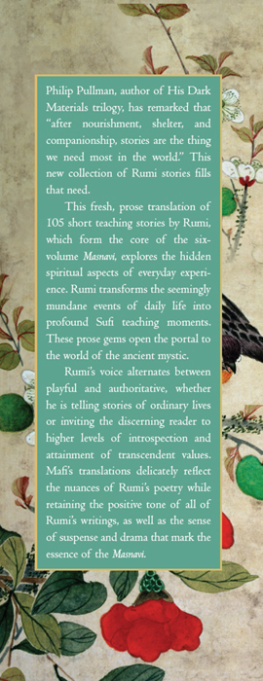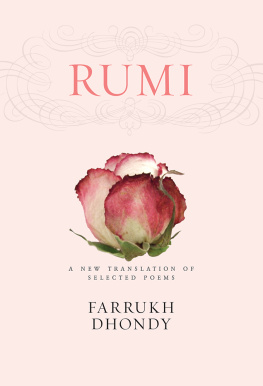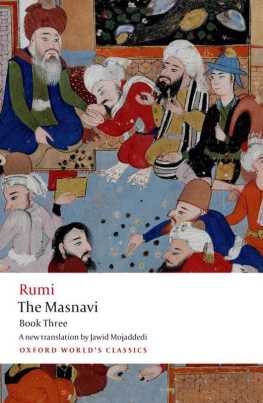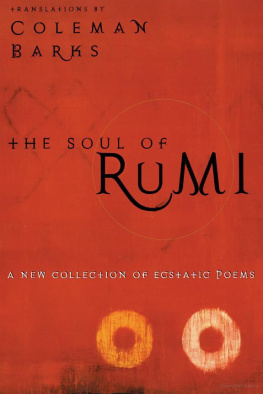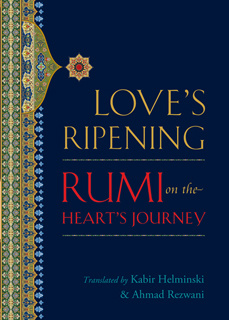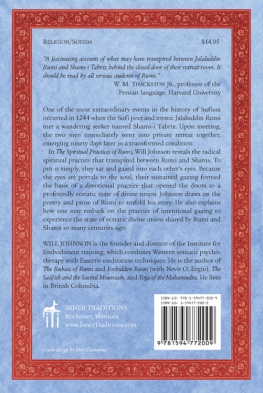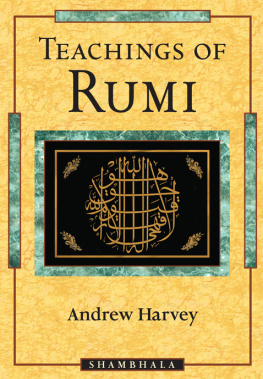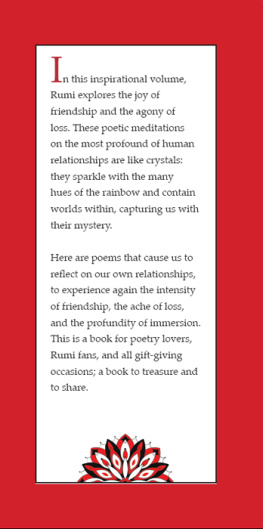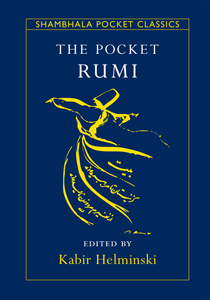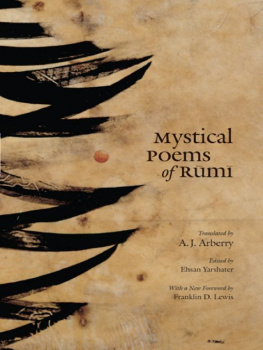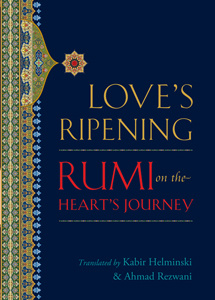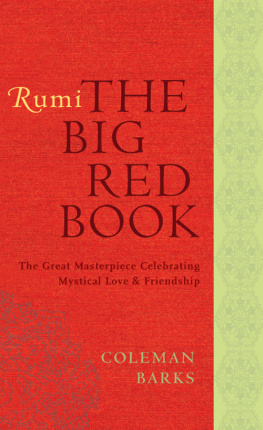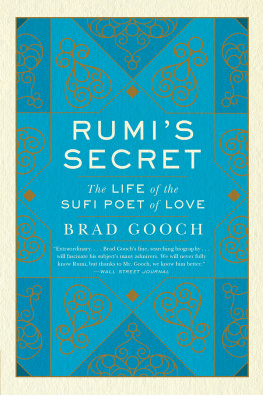Rumi - Soul Fury: Rumi and Shams Tabriz on Friendship
Here you can read online Rumi - Soul Fury: Rumi and Shams Tabriz on Friendship full text of the book (entire story) in english for free. Download pdf and epub, get meaning, cover and reviews about this ebook. publisher: HarperCollins, genre: Art. Description of the work, (preface) as well as reviews are available. Best literature library LitArk.com created for fans of good reading and offers a wide selection of genres:
Romance novel
Science fiction
Adventure
Detective
Science
History
Home and family
Prose
Art
Politics
Computer
Non-fiction
Religion
Business
Children
Humor
Choose a favorite category and find really read worthwhile books. Enjoy immersion in the world of imagination, feel the emotions of the characters or learn something new for yourself, make an fascinating discovery.
- Book:Soul Fury: Rumi and Shams Tabriz on Friendship
- Author:
- Publisher:HarperCollins
- Genre:
- Rating:3 / 5
- Favourites:Add to favourites
- Your mark:
- 60
- 1
- 2
- 3
- 4
- 5
Soul Fury: Rumi and Shams Tabriz on Friendship: summary, description and annotation
We offer to read an annotation, description, summary or preface (depends on what the author of the book "Soul Fury: Rumi and Shams Tabriz on Friendship" wrote himself). If you haven't found the necessary information about the book — write in the comments, we will try to find it.
Rumi: author's other books
Who wrote Soul Fury: Rumi and Shams Tabriz on Friendship? Find out the surname, the name of the author of the book and a list of all author's works by series.
Soul Fury: Rumi and Shams Tabriz on Friendship — read online for free the complete book (whole text) full work
Below is the text of the book, divided by pages. System saving the place of the last page read, allows you to conveniently read the book "Soul Fury: Rumi and Shams Tabriz on Friendship" online for free, without having to search again every time where you left off. Put a bookmark, and you can go to the page where you finished reading at any time.
Font size:
Interval:
Bookmark:
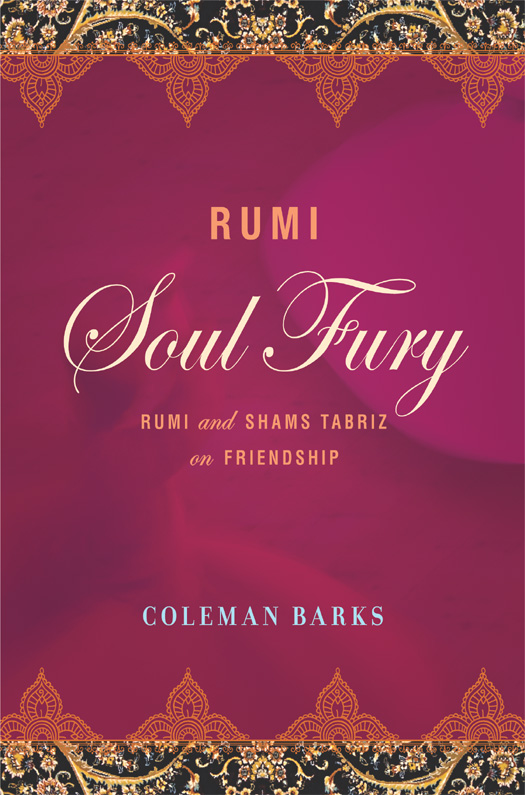
Rumi always works in tandem, with a friend, or friends. Or, to say it another way, his poetry is communal, with very personal touches. It is difficult to describe the process, though we all have probably experienced it. Out of his deep friendship with Shams Tabriz came the overflowing creativity of the collection he calls The Works of Shams Tabriz, or the Divani Shamsi Tabriz, often now called just The Shams. At the end of the poem, where the poet traditionally signs the poem by mentioning his own name, you will never find Rumis name. Most often he mentions Shams, but sometimes another friend, Saladin Zarkub the goldsmith. Sometimes he gives the poem back into silence, sometimes into sunlight.
And out of his friendship with Husam Chelebihis scribe and chief disciple, and his tandem-work friend after Shams and Saladin were gonecame the ocean of the six books of the Masnavi. He calls the whole thing The Book of Husam. Here is how the prelude to Book IV begins: Husamuddin! Ziya-Haqq, Gods light, you draw this Masnavi out into the open again, your rope around its neck leading God knows where! Some have expressed gratitude for this poem; this poem itself lifts hands in thanksgiving, glad as a vineyard in summer heat. The caravan loads up and breaks camp. Patience leads the way into joy. Face down, flat on the earth.
Husam, the sun-sword of one light, many wander in moonlight, but when the sun comes up, the markets open. Exchange gets clear. Buyers and sellers can tell false coins from true. Thieves recede from the scene. Only counterfeiters and those who need to hide avoid sunlight. Let Book IV be part of the light! That is what his tandem creativity sounds like in action with Husam Chelebi.
It is clear evidence of Rumis kindness. The interior of a Rumi poem is friendship with a specific human being and with the mystery of Allah, which he calls the friend, or the unsayable absence, or daylight, or night, or the presence inside the growing springtime green, or many other things. Rumis poetry is very consciously engaged in collaborative listening and making, the friendships and the powerful conversational dynamic going on in and around it there in the moment of its making. The poems come out of his love, and perhaps we love them for the glimpses they give of that, as well as for the light and the grieffor the taste of how it is to be, and how it is to be nothing at all. I am not interested in placing these poems in a particular religious tradition. Rumi was a devout Muslim, a Sufi.
Many of these poems are glosses on passages from the Quran. But he has also been heard as a more universal voice. This is what I try to bring forward. His poetry is honored and delighted in by many traditions and cultures. A great percentage of the worlds people now are drawn to a sense of the sacred that is beyond belief and beyond a specific sacred text, beyond a church and a priesthood and beyond the bureaucracy of religious culture.
I met a beautiful man once, Jelaluddin Chelebi, who was at the time the head of the Mevlevi Order, the one begun by Rumis son. I met a beautiful man once, Jelaluddin Chelebi, who was at the time the head of the Mevlevi Order, the one begun by Rumis son.Chelebi was visiting Atlanta. He sat me down and said, Now, what religion are you? I raised my arms in the who knows gesture. Good, he said. Love is the religion, and the universe is the book. At the time he was the direct living descendant in the line of Rumi. Yes! I said quickly.
Religious traditions have served us well in some ways and ill in others. Surely it is felt as arrogance now to claim that one set of doctrines, one sacred text, is more true than another. And it is a cruel distortion of soul-compassion to kill people who disagree with our assertion of some exclusive truth. This has got to stopthe sectarian conflict, the empire and hegemony aggressions. Of course, we must also admit that some people do live in a consciousness that is more compassionate and wiser than others. I once asked such a teacher, Bawa Muhaiyaddeen, what it was like to be him, as opposed to being me. He answered with a fable.
There was once an ocean frog who came to visit a frog living in a ditch three feet by four feet and two feet deep. The frog jumped proudly all around his ditch, side to side and down to the bottom. When he came up, he asked the ocean frog, Is this not a wonderful place to live? I am having such a fine time in this ditch. Yes, it is an amazing place, said the ocean frog. How is it where you live? asked the ditch frog. Thats hard to talk about, because where I live has no boundaries.
It is infinite. It has no shore. Bawa explained that where I lived was bounded by mind and desire. Where he lived was beyond those constrictions. The ocean frog then says, I may not be able to tell you about it, but someday I hope to take you there. You can be in that shoreless ocean with me.
Twenty-five years later, I came across this Taoist text by Chuang Tzu from the fourth century BCE : The god of the North Sea said, You cannot discuss the ocean with a frog in a wellhe is trapped in a confined space. You cant speak of ice to a summer insectit is bound by one season. You cant speak of the Way with a biased scholarhe is limited by partiality. Now that you [the river god] have come out through the cliffs and gazed at the great sea, you know your relative insignificance; now it is possible to talk to you of the great underlying pattern. Bawa had used the old Taoist story to answer my question. (The parable probably has many lineages.) He was open to truth from any culture and from every human life.
When you came into his room, he always wanted to know what you had been doing earlier that day. Then he would use that as a point of reference. The great teachers and saints of every tradition know that there is a table where we can all sit down, everybody in this mysterious, hilarious family. So I agree with those two Jelaluddins, Chelebi and Rumi. Love, together with kindness, is the religion that we must learn to practice more and more deeply, in all the many ways that there are to love. This universe and our lives as we are daily leading them are the book that we delight in studying, this shared experience of being alive.
The excitement and the depth of sharingthat friendshipare some of what Rumi and Shams are teaching. May we read this superbly edited text (the world) long and well together. The mountains, the animals, the breathing plants and wildflowers, the languages and dialects, what happens in the news each day, the mineral deposits, the billions of galaxies, the four hundred billion stars with their solar systems in just our Milky Way, this new grandson Henry running down the hall doing laps. Lord.
Font size:
Interval:
Bookmark:
Similar books «Soul Fury: Rumi and Shams Tabriz on Friendship»
Look at similar books to Soul Fury: Rumi and Shams Tabriz on Friendship. We have selected literature similar in name and meaning in the hope of providing readers with more options to find new, interesting, not yet read works.
Discussion, reviews of the book Soul Fury: Rumi and Shams Tabriz on Friendship and just readers' own opinions. Leave your comments, write what you think about the work, its meaning or the main characters. Specify what exactly you liked and what you didn't like, and why you think so.

